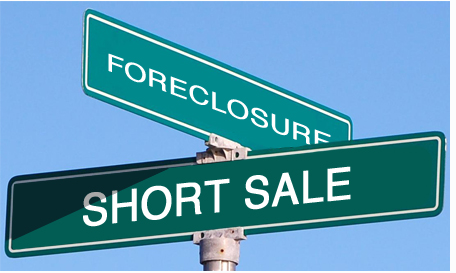Short sale Versus Foreclosure which is better ?
First let me say that if you are seriously considering either of these then you are not alone. The Mortgage Banker Association recently estimated that 1 out of every 200 homes in the US will be foreclosed upon – so there are many homeowners dealing with this difficult situation. The answer to that question is not the same for everyone. For some it is easier to let the bank take their home but that might not be the smartest thing to do.
Benefits of a Short Sale
- The sale of your home will be handled like any other home sale.
- The sign in your front yard will not announce your financial situation.
- You can be current on your payments and still short sale.
- You will have a trusted Realtor® to handle the transaction for you.
- If you meet certain requirements and have never fallen behind 30 days in your payments then Fannie Mae guidelines may allow you to buy another home immediately.
- If you are in behind in your payments and a short sale is ok’d by your lender you may be able to get a Fannie Mae backed mortgage within 2 years or 3 years for FHA
***Buying after a foreclosure: You MAY be able to get financing on a home after 5 years if the home was your primary residence but normally it will take 7 years
How a short Sale will affect your credit
There is no doubt that a short sale is going to ding your credit. It does not, however, show up on your credit report as a “Short Sale” instead it will say “settled for less than owed” or “paid in full for less than agreed”.
How a Foreclosure will affect your credit
According to my preferred lender, Artin Fallahi with Option One Lending, your FICO score can drop 100 – 200 points. A foreclosure shows up on your credit report and stays there for 7 years. Foreclosures can also keep you from renting a property.
Deficiency Judgments After a Short Sale
Effective January 1, 2011, California first trust deed mortgage holders who consent to a short sale of residential property (up to four units) are prohibited from seeking a deficiency judgment for the difference between the mortgage balance and the proceeds realized through the sale.
A new law brought about through Senate Bill 931 (Ducheny) which was passed by the legislature in August and approved by the Governor September 30, 2010.
According to the author, the purpose of the legislation was “primarily to protect distressed homeowners who have non-purchase money recourse loans on residential property (1-4 units), when the fair market value of the subject property is less than the balance of the first deed of trust. The legislation will make sure that these homeowners do not incur a higher dollar amount of liability after a short sale than they would otherwise have after a foreclosure sale.”
Deficiency Judgments After a Foreclosure
Banks are generally unwilling to negotiate deficiency judgments with the homeowner after a foreclosure. In California, for example, according to the California Association of REALTORS, a deficiency judgment may be filed regarding a hard-money loan if the lender forecloses under a judicial foreclosure versus a trustee sale or if the second loan is a hard money loan and the sale takes place as a trustee’s sale.
Loan Application Questions After a Short Sale
Loan applications do not ask questions about a short sale. You may report that you sold your home.
Loan Application Questions After a Foreclosure
You are required to answer the question: “Have you ever had a property foreclosed upon or given a deed-in-lieu thereof in the past 7 years.” If the bank sees you have had a foreclosure, your loan most likely will be denied. If you lie you are committing mortgage fraud.
Always obtain legal and tax advice before making a decision between a short sale or a foreclosure.
